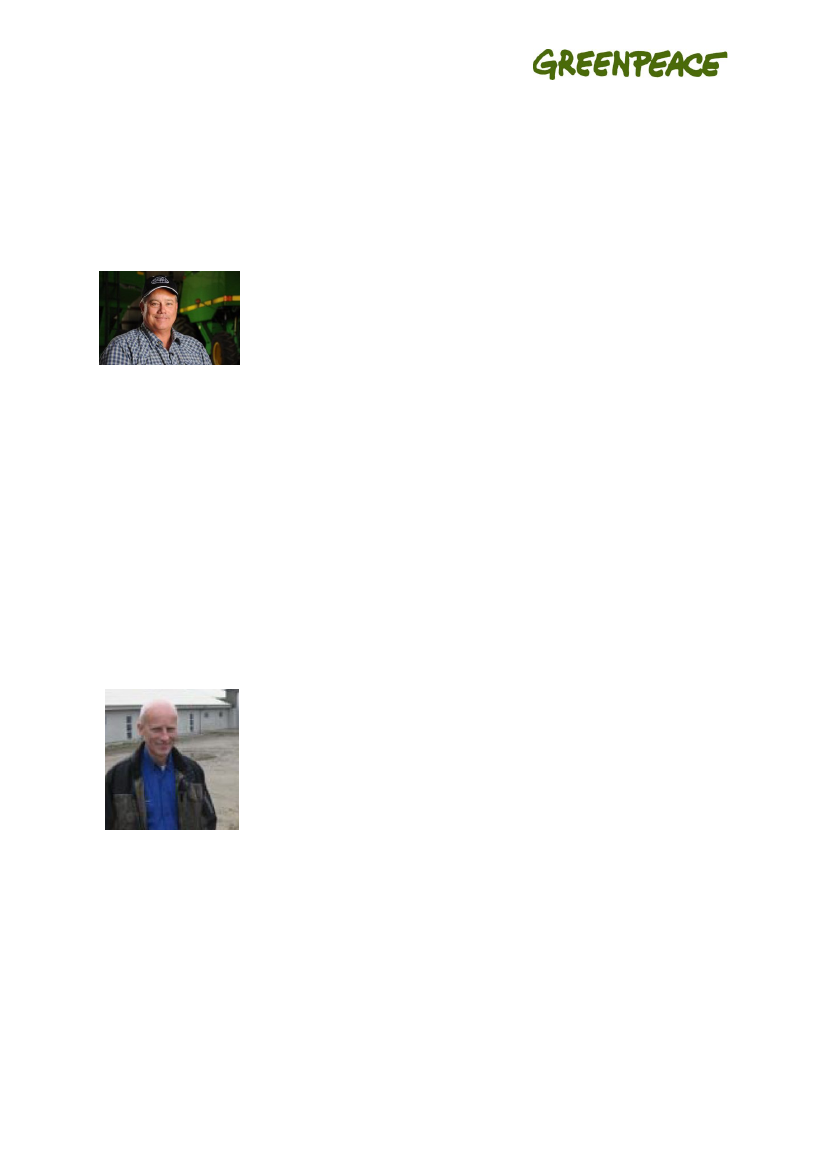Miljøudvalget 2012-13, Udvalget for Fødevarer, Landbrug og Fiskeri 2012-13
MIU Alm.del Bilag 36, FLF Alm.del Bilag 21
Offentligt
Giftforbrug og GMO på gårdniveauHvad venter os, hvis vi tillader dyrkning af sprøjtegifttolerante GMO-afgrøder i Europa?
Invitation (Mødet foregår på engelsk)Tid: 23 oktober 2012, kl 14 – 16Sted: Nationalmuseets biografsal, Frederiksholms kanal 12, 1220 København K(indgang gennem museets hovedindgang)Gratis deltagelse, tilmeldelse ved mail til[email protected](navn, organisation og mobil nr)
Den amerikanske landbrugs økonom Charles Benbrooke har på foranledning af Greenpeacxeberegnet hvor meget ekstra sprøjtegift det vil medføre i Europa hvis vi tillader GMO-dyrkning. DrCharles Benbrooke fremlægger sine fremskrivninger på mødet den 23. oktober.Til mødet vil der desuden være indlæg fra landmænd fra USA og Danmark der fortæller om dereserfaringer med GMO på gårdniveau.Der er 26 GMO-afgrøder, som afventer EU's tilladelse til dyrkning i Europa. Af disse er flertallet (19GMOer) gensplejset til at kunne overleve sprøjtning med ukrudtsgift. De mest anvendte GMO-afgrøder er designet til at bruges i kombination med sprøjtegiften Roundup.Roundup anvendes allerede i stor stil i dansk landbrug. Roundup blev fundet i grundvands-varslingssystemet i 2003. Den daværende regering undlod at gribe ind, og siden er der gentagnegange blevet konstateret af Roundup i grundvandsboringer.Ingen ønsker afgrøder der medfører øget pesticidforbrug. EU's miljøministre har derfor krævet, atden sprøjetegift der skal bruges sammen med GMO-afgrøden, skal indgå i beslutningsgrundlagetinden EU godkender GMO-afgrøder.Program:14:00: Velkomst v. Dan Belusa, Greenpeace14:05: Fremskrivning af sprøjtegiftforbruget i Europa hvis vi vælger at tillade GMO-dyrkning v. Dr. Charles Benbrooke14:35: ”Growing Doubts”, 20 min film om erfaringerne med GMO landbrug i USA ogArgentina.14:55: Spørgsmål og erfaringsudveksling om GMO på gårdniveau v. Wes Shoemyer(Missouri) og Wendel Lutz (illinois), begge er amerikanske landmænd med egen erfaringfra GMO-landbrug.15:20: Konkrete fordele og erfaringer ved at undgå GMO-soja og Roundup sprøjtet foderv. Ib Borup Pedersen, konventionel svineproducent i Danmark15:40- 16:00: afsluttende spørgsmål (der er indlagt lidt tid til spørgsmål i CharlesBenbrookes indlæg)
Med venlig hilsenDan Belusa, Greenpeace1
Biographies of speakers
Charles BenbrookDr. Charles Benbrook is a research professor at the Center for Sustaining Agriculture andNatural Resources, Washington State University. He is the program leader of “Measure to Manage:Farm and Food Diagnostics for Sustainability and Health.”Benbrook worked in Washington, D.C. on agricultural policy, science and regulatory issues from 1979through 1997. He served for 1.5 years as the agricultural staff expert on the Council forEnvironmental Quality; from 1981-1983, he was the Executive Director of the Subcommittee onDepartment Operations, Research, and Foreign Agriculture, U.S. House of Representatives; from1984-1990, served as the Executive Director, Board on Agriculture, National Academy of Sciences; heran Benbrook Consulting Services from 1991 through 2006.Benbrook has a PhD in agricultural economics from the University of Wisconsin-Madison and an undergraduate degree from Harvard University. He holds an adjunct faculty positionin the Crop and Soil Sciences Department, Washington State University. He has written more thantwo-dozen peer reviewed articles in a wide range of technical journals and served on manycommittees and boards.His career has focused on developing science-based systems for evaluating the public health,environmental, and economic impacts of changes in agricultural systems, biotechnology, and policy.He has worked extensively on pesticide use and risk assessment, and the development ofbiointensive Integrated pest Management. He played an important role in the evolution of the 1996"Food Quality Protection Act," and has produced multiple reports on agricultural biotechnology.Dr. Benbrook can be reached at [email protected], or by phone at 541-828-7918.Wes Shoemyer
Wes Shoemyer is a third generation family farmer from Missouri, USA. On his family’s farm of 3,000acres they grow corn, soybeans, wheat, clover, hay and have a cow/calf operation. He has beeninvolved in several farm groups and was instrumental in forming two – he was one of the originalincorporators of the Institute for Rural America, and also the Missouri Farmers Union. He is amember of the Northeast Missouri Grain Processors, Ozark Mountain Pork, and Premium Ag – allNew Generation Coops designed to add value to raw agricultural products. He is a life member ofthe National Farmers Organization.
2
Wes’ farm is a true family operation. He farms with his father, brother-in-law, and his son, who hasreturned to the farm following college. Wes became involved in politics after realizing that policymakes a difference, as he watched farmers’ independence being threatened by corporatedomination. He was elected to the Missouri House of Representatives in 2000 and served until2006, when he was elected to the Missouri Senate. He lives and works on the farm with his wifeCheryl. They have four children, Wendy, Laura, Amy, and Andrew Shoemyer.Wendel Lutz
Wendel is a third generation farmer whose family owns 500 acres of farmland in Illinois, USA. Theygrew conventional varieties of yellow corn and soy beans on the farm, until Wendel decided toswitch to GE crops in 2006 as an experiment. He is now traveling to Europe to share his experienceof planting herbicide tolerant crops, hoping to dissuade farmers who may be considering similarchanges to their farming practices. As he faces the threat of drastically reduced yields, Wendelhopes to be able to stay in business and survive financially; he is counting on an increase in cropprices, and wants to increase crop diversity on his farm. (Optional– use where relevant:For instance,he hopes to plant more wheat.)As someone with over twenty years of experience in farming, Wendel is very passionate about thefight to get farmers a fair price for their work. He is part of the National Farmers Union, for whom heis the State Officer for Illinois. He is also a member of the National Organization for Raw Materials: asmall advocacy group working to secure a better monetary policy for agriculture in the US.Ib Borup Pedersen
Ib Borup Pedersen grew up on a farm with cows, pigs, fields and forest. He now runs his own farm inHvidsten with 450 sows, 30kg pigs and 200 hectares. Ibs keen interest in nature and agriculturemeant that he from the start was skeptical of GMOs. In 2010, Ib decided to drop the use of bothRoundup and GMO soy in his sow-feed. Despite the somewhat higher feed costs, the shift alsobecame an economic advantage. The improved well-being in the sow-barn meant less disease andmortality in both sows and piglets, which in itself resulted in increased revenue but also in reducedcosts for antibiotics and labor.Ibs extensive work to share his experience of GMO-free and Roundup-free farming and his greatknowledge of the GMO-issue has put him in contact with a large number of scientists and farmersboth in Denmark and abroad.http://www.gmwatch.org/files/GM-Soy-linked-to-health-damage-in%20pigs-a-Danish-Dossier.pdf3



